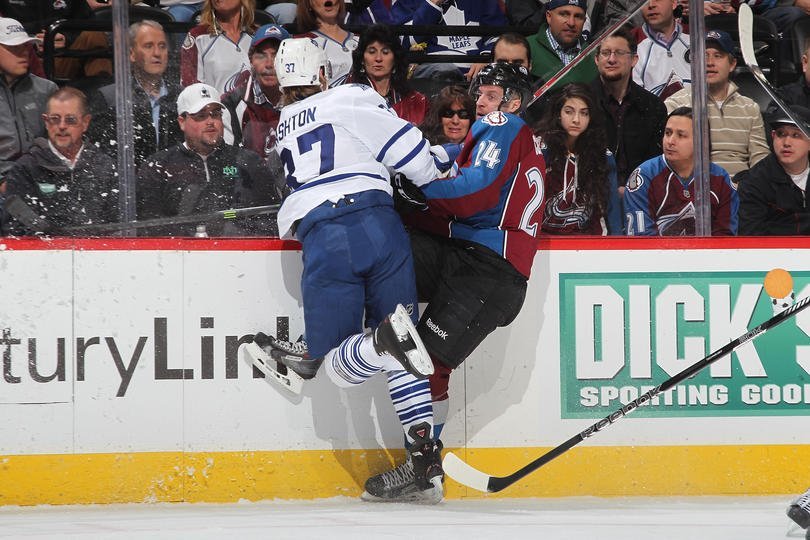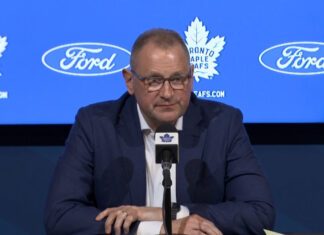With the announcement yesterday afternoon that Maple Leafs winger Carter Ashton has been suspended for violation of the NHL/NHLPA Performance Enhancing Substances Program as a result of his use of a PED containing inhaler, many Leafs fans are wondering what impact this will have on the Toronto Maple Leafs.
Article 47.7(a)(i) provides that a first positive test will result in a 20 game suspension without pay.
So what does this mean for the Leafs in terms of salary cap? According to Article 50.10(c):
Player Salary and Bonuses that are not paid to such Player shall not count against a Club’s Upper Limit or against the Players’ Share for the duration of the suspension, but the Club must have Payroll Room for such Player’s Salary and Bonuses in order for such Player to be able to return to Play for the Club.
Since Ashton’s suspension is without pay, Article 50.10(c) relieves the Leafs of the cap hit associated with the salary and bonuses that he will not be paid during the course of the suspension.
For those that are interested (i.e. the Ashton family and his agent), by virtue of Article 47.7(b), Ashton will not receive any pay from today (the effective date of the suspension) until 10-days prior to the end of the 20 game suspension, at which time he’ll begin receiving 60% of his pay, and be allowed to return to club meetings and practices. Presumably then, the Leafs will have relief from his paragraph 1 salary and bonus until at least that time.
Many Leaf fans are also wondering why Ashton has announced that he won’t be appealing his suspension. Although it’s admittedly conjecture on my part – given how early we find ourselves in this story – my assessment is that he’s not appealing because of the onus of proof requirements in Article 47.9 of the CBA.
Article 47.9 states that there is strict liability for any infraction of the Performance Enhancing Substance Program. What is strict liability you ask? Let me answer that by way of analogy. In criminal law, an accused is presumed to be innocent until proven guilty, and in order to be guilty of a crime the accused must have committed the act (called the actus reus) and also have had sufficient knowledge of what they were doing (called mens rea). In order to prove someone guilty of a crime, you have to prove beyond a reasonable doubt that they both committed the act and had the requisite state of mind.
By contrast, strict liability is only concerned with the actus reus, and in order to find someone guilty of a crime that carries strict liability, you do not need to prove any sufficient knowledge or intent. In other words, the act is itself sufficient to prove guilt in almost all cases, and if you’ve committed the act you are accordingly presumed guilty.
Strict liability generally carries only very limited defences, and in the NHL (pursuant to Article 47.9) the only defences are: (i) a therapeutic use exemption; (ii) collection error; (iii) testing error; or (iv) that the player could not reasonably ascertain how the substance entered his body (i.e to guard against someone sabotaging a player).
Since Ashton seems to clearly know how and why the drug showed up in his system, and seems to accept that it is or was in fact in his system and wasn’t a testing or collection error, none of these defences would apply even though it might have been an honest mistake.
In regards to the Therapeutic Use Exemption, the CBA doesn’t provide a great deal of assistance in determining when this might apply, and the only case I can recall from experience was José Theodore’s somewhat infamous propecia case. However, as the drug in that case was used to maintain his glorious flow and had no performance enhancing properties of its own other than the potential to mask the presence of other PED’s in his system, it seems to have little precedential value for Ashton, who appears to have taken a drug that improves cardiovascular conditioning and was therefore using a legitimate PED.
In short, Ashton isn’t appealing because his chances of success are next to none. That’s the nature of strict liability.
Some of you might also be wondering why Ashton’s suspension doesn’t count against the cap, but Voynov’s does for Los Angeles. Voynov’s suspension is very different than Ashton’s and arises under Article 18-A2 of the CBA, pursuant to which the Commissioner can suspend a player for off-ice conduct that is detrimental to the reputation of the NHL. Under Article 18-A2, it is open to the Commissioner to suspend a player without pay, or cancel their contract entirely in the most egregious cases. However, in this case it has been reported that Voynov has been suspended with pay; that being the case, LA doesn’t get the benefit of Article 50.10(c) the way the Leafs will with Ashton.
So why does Voynov get suspended with pay and yet Ashton gets suspended without, for what seems by comparison to be a minor transgression? Well, that takes us back to the difference between criminal liability and strict liability offences. Although Ashton’s transgression is relatively minor by comparison, all of its constituent elements have already been proven: he took the drug, the drug is banned, and none of the defences apply; end of story.
In Voynov’s case, all that has occurred is that allegations have given rise to the player’s arrest. However, none of those allegations have been proven in court and the player is still presumed to be innocent of all charges until proven otherwise. In order to be found guilty the District Attorney will have to prove beyond a reasonable doubt that Voynov not only did what was alleged, but possessed the requisite mens rea or guilty mind in so doing.
Unlike Ashton and his strict liability offence, you can see how there are a number of ways that Voynov might ultimately be able to escape legal punishment, and not be found guilty since there are many more moving parts. Because of the potential that he might ultimately not be guilty, although the NHL acted quickly in suspending Voynov, it took a cautious approach and has not immediately suspended the player’s pay until more information comes to light. You can bet that, if Voynov’s case takes a turn for the worse, the NHL will act with similar swiftness and issue a lengthy suspension without pay. Until then, LA is on the hook for the cap hit.
I hope that helps clear up some of these very complex legal issues. Until next time, thanks for reading!

































